
CRISPR-Chip Featured on the Cover of Nature-Biomedical Engineering
July 24, 2019
The Aran Lab’s CRISPR-CHIP was featured on the cover on Nature Biomedical Engineering for the June 2019 edition. See the nature biomedical engineering cover

July 24, 2019
The Aran Lab’s CRISPR-CHIP was featured on the cover on Nature Biomedical Engineering for the June 2019 edition. See the nature biomedical engineering cover
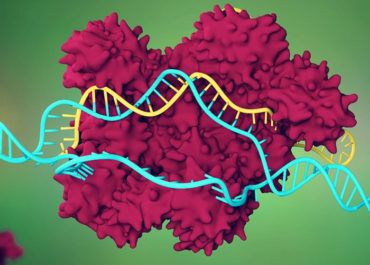
July 22, 2019
Searching a sample of DNA for a particular sequence—be it a mutation, a researcher-inserted transgene, or evidence of an infecting organism—is a common practice in many molecular biology and diagnostic laboratories around the world. Often, such searches take the form of target amplification, which involves using sequence-specific oligonucleotide primers and the action of a DNA […]
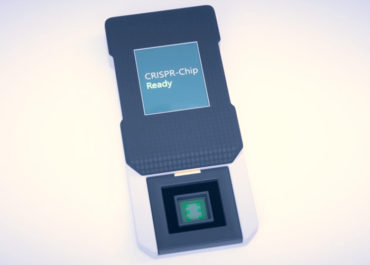
March 25, 2019
Researchers have found multiple applications for the CRISPR (Clustered Regularly Interspersed Short Palindromic Repeats) gene editing technology since it came into use by the scientific community. Keck Graduate Institute (KGI) Assistant Professor and University of California, Berkeley Visiting Scientist Kiana Aran is the first to combine the power of CRISPR’s nucleic acid targeting with the […]
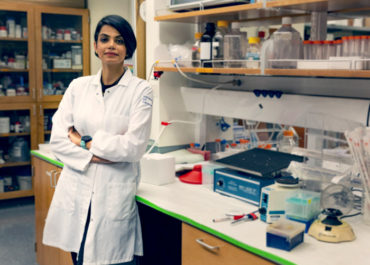
March 25, 2019
Kara Manke at UC Berkeley News highlights the collaborative team’s development of CRISPR-Chip. A team of engineers at the UC Berkeley and the Keck Graduate Institute (KGI) of The Claremont Colleges combined CRISPR with electronic transistors made from graphene to create a new hand-held device that can detect specific genetic mutations in a matter of […]
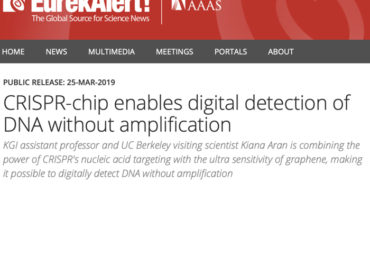
March 25, 2019
EurekAlert! published an article, “CRISPR-chip enables digital detection of DNA without amplification” that highlights the Aran Lab’s research and recent publication in Nature Biomedical Engineering. “KGI assistant professor and UC Berkeley visiting scientist Kiana Aran is combining the power of CRISPR’s nucleic acid targeting with the ultra sensitivity of graphene, making it possible to digitally […]

March 21, 2019
At the 2019 Society for Laboratory Automation and Screening (SLAS) Conference, Dr. Aran presented on “Applications of Graphene Biosensors in Basic Research and Clinical Diagnostics” which discussed modern applications of graphene biosensors for facile identifications of pathological changes in age-associated diseases.

March 21, 2019
This March, Dr. Aran was invited to speak at the Nature Conference: In Vitro Diagnostics at the Shanghai Jiao Tong University. Conference Description. In Vitro Diagnostics (IVD) aim to provide fast, reliable and cost-effective means to support the detection and treatment of disease, and the monitoring of its response to therapy. This Nature Conference will […]
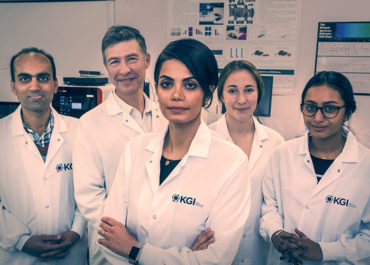
March 21, 2019
This Monday the Aran Lab’s research, “Detection of unamplified target genes via CRISPR/Cas9 immobilized on a graphene field-effect transistor” was published in Nature Biomedical Engineering. The team developed an electrical biosensor combining CRISPR/Cas9 and a graphene field-effect transistor that detects target genes in purified genomic samples at high sensitivity, within 15 minutes, and without the […]

February 11, 2019
“As good chefs stress, presentation matters. The same holds true for vaccine makers, who know that how you deliver the ingredients powerfully affects potency. Now, researchers have devised a gel pill that can painlessly spray vaccine into the cheek and reach cells in the underlying tissue, potentially triggering what’s known as a mucosal immune response. […]
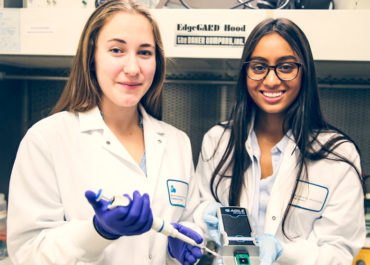
November 7, 2018
“Since 1900, the percentage of Americans age 65 and over has more than tripled (from 4.1% in 1900 to 15.2% in 2016), with a total population projected to reach 98 million in 2060. As the population ages, the incidence of age-related health conditions also increases, and the need to identify and treat aging-related health conditions […]